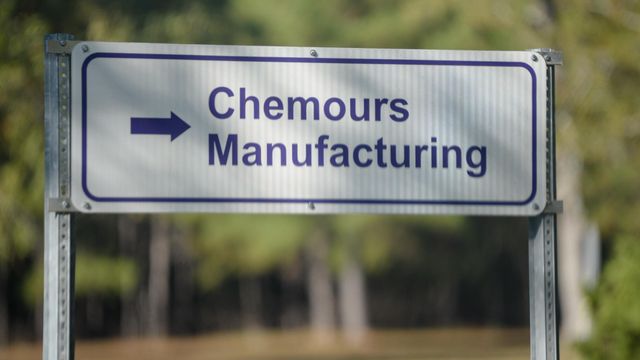Health officials to begin testing Chemours neighbors for GenX
Government health officials will soon begin testing a small group of residents near a Bladen County chemical plant for GenX and other unregulated contaminants with unclear impacts on human health.
Posted — UpdatedThe state Department of Health and Human Services said Tuesday that officials will begin calling residents near Chemours' Fayetteville Works facility this week to look for 30 volunteers who will submit to blood and urine sampling. The federal Centers for Disease Control and Prevention, which is limited in its testing capacity, will conduct the analysis to look for GenX and 16 other related per- and polyfluorinated substances, often called PFAS.
"The first step is to really see whether these things can be found," State Epidemiologist Dr. Zack Moore said in an interview Tuesday. "That's why this is sort of a small step, but a very important step in the process."
Unanswered questions remain
Some GenX research points to a cancer link in animals, but its effects on human health are largely unstudied. It was designed as the replacement for C8, a compound linked to cancer that's the focus of thousands of lawsuits against DuPont, which spun off Chemours in 2015.
Moore said the small sample size means the results won't be representative of the larger community in Cumberland and Bladen counties, where hundreds of private drinking water wells have elevated concentrations of GenX and other compounds. But he said learning whether health officials can accurately detect the presence of the compounds in blood or urine could lead to expanded studies by federal health officials or academic researchers.
The results will also likely provide valuable comparisons for a larger project out of North Carolina State University to test the blood and urine of 350 people in the Wilmington area.
Jane Hoppin, an environmental epidemiologist and associate professor of biological sciences at N.C. State who's leading the Wilmington study, said the testing near the Chemours plant is a good start.
"No one really knows how exposed the people who live around the plant are given well contamination and the release of this contamination in the air for 40 years," Hoppin said.
Moore cautioned that the lack of previous research on GenX and other compounds means the tests won't be able to provide residents with much information about potential health effects if they're detected in blood or urine.
"People are familiar with going to your doctor and getting a lab test for cholesterol, which might come back as high or low," Moore said. "There's nothing like that for these chemicals because we don't know what levels are and are not associated with particular health outcomes."
He added that because they're manmade chemicals, "there would be no level we would be considered normal."
"But the question is whether we have any way to compare against any other group that lives elsewhere," Moore said.
State regulators last year set a health goal for concentrations of GenX in water at 140 parts per trillion, a conservative estimate they say is safe for a baby being bottle-fed formula prepared from drinking water. A panel of scientists is reviewing that threshold and could revise it up or down.
Since Chemours and environmental regulators began sampling nearby private drinking water wells last year, the state says more than 200 wells in the vicinity of the plant have tested above the safety threshold. Health officials say they'll contact residents with the highest concentrations of GenX in their wells first.
The DHHS press release says the study will include no more than one adult and one child older than 12 per household.
Chemours: No impacts on safety
PFAS compounds have been at the center of controversy since June 2017, when the StarNews of Wilmington revealed that GenX – a component in used to make Teflon, fast food wrappers and other products – was present in the Cape Fear River and treated drinking water as far downstream as Wilmington.
Chemours has maintained that GenX and other related substances have not affected the safety of drinking water in the state. But in response to public backlash and state regulatory action, the company has halted the release of GenX in its wastewater streams and pledged $100 million in upgrades to their facility to reduce their PFAS emissions via air and water by 99 percent over the next two years.
Since well testing began, the company has been providing bottled water to affected residents under the direction of state environmental regulators.
But on Tuesday afternoon, company officials announced that they would begin offering whole-house filtration systems free of charge to nearby well owners with elevated levels of GenX.
Citing results from a pilot study, Chemours said the granular activated carbon systems on offer remove concentrations of GenX and related compounds from drinking water.
"We've listened to our impacted neighbors and want to address those concerns quickly and effectively," Brian Long, Chemours' Fayetteville Works plant manager, said in a press release. "We're committed to making whole-house GAC filtration systems available now to impacted residents, at no cost to them, to ensure they can turn on any faucet and access drinking water throughout the entire house without concern."
But state environmental regulators say they're not yet convinced.
State Department of Environmental Quality spokesperson Bridget Munger said the agency is still collecting data from its pilot study that will tell them how effective the filters are and how often they need to be maintained and repaired.
"DEQ does not consider filtration systems to be a long-term solution for well owners whose tests results indicated GenX levels exceeding the state health goal," Munger said in an email. "The filtration systems are meant to provide well owners with an alternative to bottled water while they’re waiting for a permanent solution."
Related Topics
• Credits
Copyright 2024 by Capitol Broadcasting Company. All rights reserved. This material may not be published, broadcast, rewritten or redistributed.






